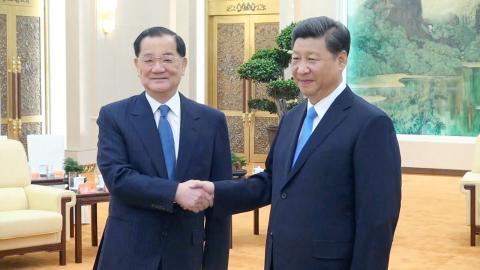It is a historical fact that the then-Chinese Nationalist Party (KMT) government led the war against Japanese aggression from 1937 to 1945, whether on the front lines or behind enemy lines, Presidential Office spokesperson Charles Chen (陳以信) said yesterday.
Chen was responding to remarks by former vice president Lien Chan (連戰), who said during a meeting with Chinese President Xi Jinping (習近平) in Beijing yesterday that the KMT under the leadership of former president Chiang Kai-shek (蔣介石) engaged directly with Japanese troops in major battles, handing the latter a major setback, and that Chinese Communist Party (CCP) troops led by former Chinese leader Mao Zedong (毛澤東) also tied down the enemy behind their lines and eventually defeated the Japanese aggressors.
“The Nationalist forces ... fought a series of decisive and major battles on the front lines and dealt the Japanese military a heavy blow,” Lien told Xi, according to Shanghai news Web site guancha.cn.

Photo: CNA
“The Chinese Communist Party forces led by Mao Zedong effectively pinned down and intercepted the Japanese and the collaborationist militaries on the battlefield behind enemy lines,” added Lien, a former KMT chairman.
Xi said Nationalists and Communists “cooperated and coordinated” in the campaign and that “both made significant contributions to the victory of [the so-called ‘Chinese People’s War of Resistance Against Japanese Aggression and the World Anti-Fascist War’],” China’s Xinhua news agency reported.
“Chinese across the Taiwan Strait must keep history in mind, remember national heroes and become united to savor the fruits of victory and jointly advance the peaceful development of our relations,” Xinhua quoted Xi as saying.
The Presidential Office said that the CCP did little to resist Japanese aggression during the Second Sino-Japanese War.
“Whether it came to engaging in combat with Japanese troops on the front lines or behind enemy lines, it was all led by the Nationalist government, which is a historical fact that cannot be denied,” Chen said.
Chen said that the government’s stance is that “it is inappropriate” for Taiwanese to attend China’s military parade tomorrow — at which Lien is expected to be present.
Beijing has held a series of events to mark the 70th anniversary of the end of World War II, with tomorrow’s military parade considered to be the highlight of the festivities.
The CCP — which defeated the KMT in the Chinese Civil War, forcing the latter to flee to Taiwan — depicts itself as having played the lead role in defeating Japan.
Taiwan said events being held by Beijing distort historical facts, as it was the KMT who fought all the major battles against Japan during an eight-year war before Allied forces intervened.
KMT presidential candidate Hung Hsiu-chu (洪秀柱) yesterday said that she has great respect for Lien, who she said has made significant contributions toward cross-strait peace.
However, Hung added that, given his position, Lien should consider the Taiwanese perspective when making public comments.
Additional reporting by Chang Hsiao-ti

MAKING WAVES: China’s maritime militia could become a nontraditional threat in war, clogging up shipping lanes to prevent US or Japanese intervention, a report said About 1,900 Chinese ships flying flags of convenience and fishing vessels that participated in China’s military exercises around Taiwan last month and in January have been listed for monitoring, Coast Guard Administration (CGA) Deputy Director-General Hsieh Ching-chin (謝慶欽) said yesterday. Following amendments to the Commercial Port Act (商港法) and the Law of Ships (船舶法) last month, the CGA can designate possible berthing areas or deny ports of call for vessels suspected of loitering around areas where undersea cables can be accessed, Oceans Affairs Council Minister Kuan Bi-ling (管碧玲) said. The list of suspected ships, originally 300, had risen to about 1,900 as

Japan’s strategic alliance with the US would collapse if Tokyo were to turn away from a conflict in Taiwan, Japanese Prime Minister Sanae Takaichi said yesterday, but distanced herself from previous comments that suggested a possible military response in such an event. Takaichi expressed her latest views on a nationally broadcast TV program late on Monday, where an opposition party leader criticized her for igniting tensions with China with the earlier remarks. Ties between Japan and China have sunk to the worst level in years after Takaichi said in November that a hypothetical Chinese attack on Taiwan could bring about a Japanese

Right-wing political scientist Laura Fernandez on Sunday won Costa Rica’s presidential election by a landslide, after promising to crack down on rising violence linked to the cocaine trade. Fernandez’s nearest rival, economist Alvaro Ramos, conceded defeat as results showed the ruling party far exceeding the threshold of 40 percent needed to avoid a runoff. With 94 percent of polling stations counted, the political heir of outgoing Costa Rican President Rodrigo Chaves had captured 48.3 percent of the vote compared with Ramos’ 33.4 percent, the Supreme Electoral Tribunal said. As soon as the first results were announced, members of Fernandez’s Sovereign People’s Party

MORE RESPONSIBILITY: Draftees would be expected to fight alongside professional soldiers, likely requiring the transformation of some training brigades into combat units The armed forces are to start incorporating new conscripts into combined arms brigades this year to enhance combat readiness, the Executive Yuan’s latest policy report said. The new policy would affect Taiwanese men entering the military for their compulsory service, which was extended to one year under reforms by then-president Tsai Ing-wen (蔡英文) in 2022. The conscripts would be trained to operate machine guns, uncrewed aerial vehicles, anti-tank guided missile launchers and Stinger air defense systems, the report said, adding that the basic training would be lengthened to eight weeks. After basic training, conscripts would be sorted into infantry battalions that would take